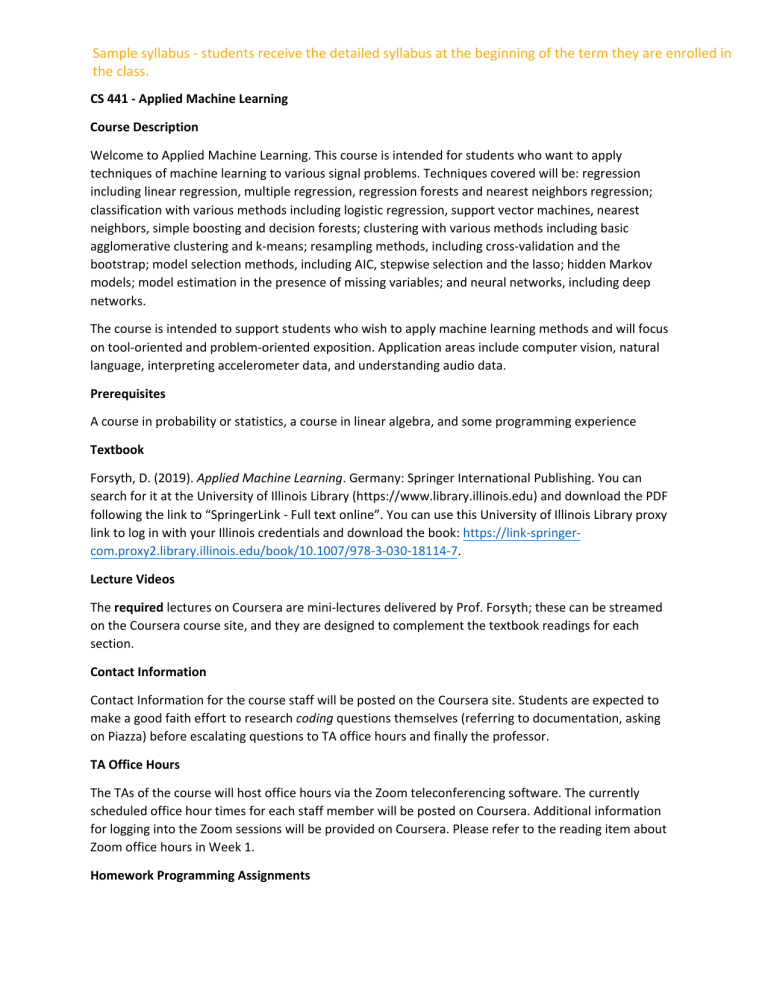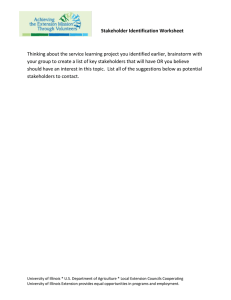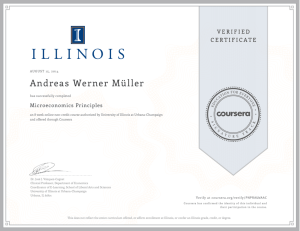
Sample syllabus - students receive the detailed syllabus at the beginning of the term they are enrolled in the class. CS 441 - Applied Machine Learning Course Description Welcome to Applied Machine Learning. This course is intended for students who want to apply techniques of machine learning to various signal problems. Techniques covered will be: regression including linear regression, multiple regression, regression forests and nearest neighbors regression; classification with various methods including logistic regression, support vector machines, nearest neighbors, simple boosting and decision forests; clustering with various methods including basic agglomerative clustering and k-means; resampling methods, including cross-validation and the bootstrap; model selection methods, including AIC, stepwise selection and the lasso; hidden Markov models; model estimation in the presence of missing variables; and neural networks, including deep networks. The course is intended to support students who wish to apply machine learning methods and will focus on tool-oriented and problem-oriented exposition. Application areas include computer vision, natural language, interpreting accelerometer data, and understanding audio data. Prerequisites A course in probability or statistics, a course in linear algebra, and some programming experience Textbook Forsyth, D. (2019). Applied Machine Learning. Germany: Springer International Publishing. You can search for it at the University of Illinois Library (https://www.library.illinois.edu) and download the PDF following the link to “SpringerLink - Full text online”. You can use this University of Illinois Library proxy link to log in with your Illinois credentials and download the book: https://link-springercom.proxy2.library.illinois.edu/book/10.1007/978-3-030-18114-7. Lecture Videos The required lectures on Coursera are mini-lectures delivered by Prof. Forsyth; these can be streamed on the Coursera course site, and they are designed to complement the textbook readings for each section. Contact Information Contact Information for the course staff will be posted on the Coursera site. Students are expected to make a good faith effort to research coding questions themselves (referring to documentation, asking on Piazza) before escalating questions to TA office hours and finally the professor. TA Office Hours The TAs of the course will host office hours via the Zoom teleconferencing software. The currently scheduled office hour times for each staff member will be posted on Coursera. Additional information for logging into the Zoom sessions will be provided on Coursera. Please refer to the reading item about Zoom office hours in Week 1. Homework Programming Assignments The course grade will be based on programming assignments. Instructions, and particular submission details will be updated as each assignment is released to students in Coursera. An assignment will clearly state when students should implement an algorithm by hand and the restrictions on the libraries to use. Some assignments will have follow-up quizzes. Homework Submission Procedures All the homework assignments should be submitted on Coursera, which will subsequently be automatically checked and graded. Grading, Deadlines, and Late Policy All the deadlines for homework assignments and quizzes are target deadlines. This means that the students are advised to meet these deadlines to ensure that they are synchronized with the flow of the course. However, there is no penalty for missing such deadlines. Nevertheless, students must submit all the assignments by the last day of classes of the semester. All homework will receive equal weight in determining the final grade. The grade for each quiz will be part of the grade of its corresponding homework. Once the final scores are determined, a grading scale will be determined to assign a letter grade. Orientation Quiz There is an orientation quiz this week to make sure you understand the course policies. It is not worth any points and you can retake it as many times as you want. Exams This semester of the course does not have any exams, only homework assignments. Academic Integrity and Citation Policy In this course, students are allowed to use library code to solve high-level problems, unless an assignment specifically requests that students implement an algorithm completely by themselves. Students should always cite any library code they have used. Students must cite online code references (documentation examples, StackOverflow, Piazza posts, Slack discussions, etc.) that they have referred to. If students collaborate to any extent, they must cite each other (name and NetID where appropriate) in their code comments.In summary, this policy reflects the University policy on plagiarism as it applies to academic writing. Students must cite all references, including any code they have used that they did not write themselves. Failure to cite references will be considered an academic integrity violation and be pursued according to University policy, which may include receiving a failing grade on an assignment or in the entire course. Citations do not need to follow any specific format (such as ACM style, etc.) but should mention the author's name and where the cited work can be found (including a URL, if applicable). In code, a citation can be left in a comment. The University of Illinois at Urbana-Champaign Student Code should also be considered as a part of this syllabus. Students should pay particular attention to Article 1, Part 4: Academic Integrity. Read the Code at the following URL: http://studentcode.illinois.edu/. Academic dishonesty may result in a failing grade. Every student is expected to review and abide by the Academic Integrity Policy: https://studentcode.illinois.edu/article1/part4/1-401/. Ignorance is not an excuse for any academic dishonesty. It is your responsibility to read this policy to avoid any misunderstanding. Do not hesitate to ask the instructor(s) if you are ever in doubt about what constitutes plagiarism, cheating, or any other breach of academic integrity. Anti-Racism and Inclusivity Statement The Grainger College of Engineering is committed to the creation of an anti-racist, inclusive community that welcomes diversity along a number of dimensions, including, but not limited to, race, ethnicity and national origins, gender and gender identity, sexuality, disability status, class, age, or religious beliefs. The College recognizes that we are learning together in the midst of the Black Lives Matter movement, that Black, Hispanic, and Indigenous voices and contributions have largely either been excluded from, or not recognized in, science and engineering, and that both overt racism and micro-aggressions threaten the well-being of our students and our university community. The effectiveness of this course is dependent upon each of us to create a safe and encouraging learning environment that allows for the open exchange of ideas while also ensuring equitable opportunities and respect for all of us. Everyone is expected to help establish and maintain an environment where students, staff, and faculty can contribute without fear of personal ridicule, or intolerant or offensive language. If you witness or experience racism, discrimination, micro-aggressions, or other offensive behavior, you are encouraged to bring this to the attention of the course director if you feel comfortable. You can also report these behaviors to the Bias Assessment and Response Team (BART) (https://bart.illinois.edu/). Based on your report, BART members will follow up and reach out to students to make sure they have the support they need to be healthy and safe. If the reported behavior also violates university policy, staff in the Office for Student Conflict Resolution may respond as well and will take appropriate action. Sexual Misconduct Reporting Obligation The University of Illinois is committed to combating sexual misconduct. Faculty and staff members are required to report any instances of sexual misconduct to the University’s Title IX Office. In turn, an individual with the Title IX Office will provide information about rights and options, including accommodations, support services, the campus disciplinary process, and law enforcement options. A list of the designated University employees who, as counselors, confidential advisors, and medical professionals, do not have this reporting responsibility and can maintain confidentiality, can be found here:wecare.illinois.edu/resources/students/#confidential. Other information about resources and reporting is available here: wecare.illinois.edu. Religious Observances Illinois law requires the University to reasonably accommodate its students' religious beliefs, observances, and practices in regard to admissions, class attendance, and the scheduling of examinations and work requirements. You should examine this syllabus at the beginning of the semester for potential conflicts between course deadlines and any of your religious observances. If a conflict exists, you should notify your instructor of the conflict and follow the procedure at https://odos.illinois.edu/community-of-care/resources/students/religious-observances/ to request appropriate accommodations. This should be done in the first two weeks of classes Disability-Related Accommodations To obtain disability-related academic adjustments and/or auxiliary aids, students with disabilities must contact the course instructor and the Disability Resources and Educational Services (DRES) as soon as possible. To contact DRES, you may visit 1207 S. Oak St., Champaign, call 333-4603, e-mail disability@illinois.edu or go to https://www.disability.illinois.edu. If you are concerned you have a disability-related condition that is impacting your academic progress, there are academic screening appointments available that can help diagnosis a previously undiagnosed disability. You may access these by visiting the DRES website and selecting “Request an Academic Screening” at the bottom of the page. Statement on Mental Health Diminished mental health, including significant stress, mood changes, excessive worry, substance/alcohol abuse, or problems with eating and/or sleeping can interfere with optimal academic performance, social development, and emotional wellbeing. The University of Illinois offers a variety of confidential services including individual and group counseling, crisis intervention, psychiatric services, and specialized screenings at no additional cost. If you or someone you know experiences any of the above mental health concerns, it is strongly encouraged to contact or visit any of the University’s resources provided below. Getting help is a smart and courageous thing to do -- for yourself and for those who care about you. Counseling Center: 217-333-3704, 610 East John Street Champaign, IL 61820 McKinley Health Center:217-333-2700, 1109 South Lincoln Avenue, Urbana, Illinois 61801 Family Educational Rights and Privacy Act (FERPA) Any student who has suppressed their directory information pursuant to Family Educational Rights and Privacy Act (FERPA) should self-identify to the instructor to ensure protection of the privacy of their attendance in this course. See https://registrar.illinois.edu/academic-records/ferpa/ for more information on FERPA. Academic Calendar • The Graduate College at the University of Illinois maintains a Graduate College calendar. The calendar includes important dates such as final exam dates, course registration and cancellation, and holidays. • There is also a campus-wide calendar available. • The CS Department also sends reminders about upcoming deadlines. You will also receive the Graduate College newsletter in your Exchange email account. Course Withdrawal and Refund For course withdrawal-related questions, please refer to the Academic Calendars. Be sure to select the current term on that page. This summer course falls under GRAD POT (Part of Term) 1, which is a full 12-week semester course. GRAD POT 1 only refers to summer courses. Spring and fall semester courses do not have multiple sessions. For course refund information, please refer to the Office of the Registrar refunds website and select the current term. You can also refer to this website for the pro-rate refund schedule if you plan to withdraw from the course after the first day of classes for any given semester.

